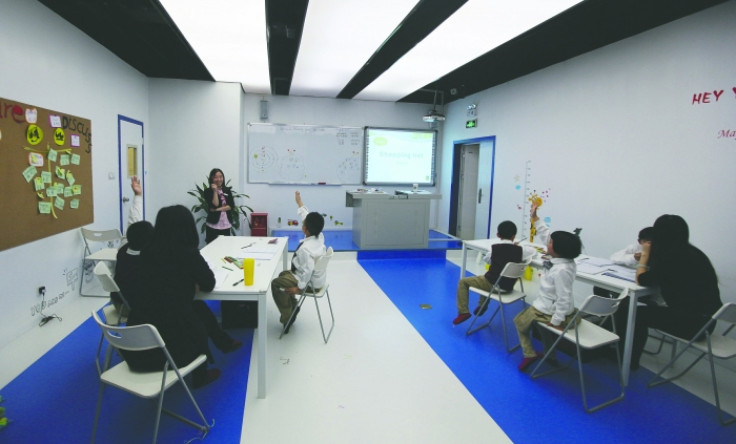Chengdu Mini-MBA Courses: Rich Chinese Parents Spend $10K To Send 7-Year-Old Children To Business School For Kids [VIDEO]

China has seen exponential growth in the number of its billionaires. According to the 2013 Hurun Report, a fifth of the world’s billionaires are from China. And now, some of these rich Chinese families are sending their young children to special training programs to help them learn and understand how to manage money, Chengdu Business Daily reported.
On the evening of March 22, a luxury car stopped in front of a financial tutorial institute in Chengdu, China. Qicheng Li (a pseudonym), 8, stepped out of the vehicle with a chauffeur holding the door. After passing security, Li walked into a classroom that has 24-hour surveillance cameras installed in all corners.
Li is only one of the 40 children between seven and 11 years old who are enrolled in the so-called “MBA programs for children” -- a reference to Master of Business Administration (MBA) programs -- because of the young age of the students and the high tuition fees. Most of these children are born to millionaire or billionaire families, the report said.
The institute in Chengdu had now organized its first term for students since it was established last August. These children will take the courses for three hours a week. The school charges 60,000 yuan ($9,675) for a two-year training program that aims to "cultivate children's ability to manage money.”
The four full-time lecturers on the program are mostly former English school teachers. According to Chengdu Business Daily, all of the teachers have financial quotient tutorial certificates from Great Britain, which are paid for by the institute in Chengdu. Part-time lecturers are education experts who fly out from Britain every three to four months to give lectures for about two weeks.
Institute director Fang Yuan says the courses boost a child’s “financial quotient," which is similar to one's intelligence quotient (IQ) and emotional quotient (EQ) test results," which measure a person’s ability to understand and manage money, she said.
Fang goes on to emphasize that they are not giving advice on frugal living. Instead, they are focusing on showing these primary school-aged children how to invest.
“Instead of telling them to save money, we teach them how to create a fortune. On advanced courses, we develop their investment awareness, so they can learn that ‘money makes money’,” Fang adds.
The report said the classes mainly involve interaction through games and field studies.
In one class that explains the value of money, children were asked to choose valuable and invaluable things from a “treasure trove.” After most children chose jewelry and gold instead of cooking pans, tooth brushes and spoons, the teachers told them that if they were stranded on a deserted island, the day-to-day items would be more valuable. The lesson aimed to stress the concept of “relative value” instead of “absolute value," the report said.
The parents of seven-year-old Shuxiu Ren (a pseudonym), who’s also enrolled in the course, said their daughter had learned a lot. Her mother said that previously the girl had no idea about budgeting but now drew up lists every time she went shopping.
Ren’s parents, who work in the foreign trade business, offer their daughter a very generous allowance. The little girl’s pink purse is always filled with no less than 1,000 yuan. To put that into context, the urban average salary in the southwestern metropolis stood at 34,008 yuan in 2011, the last time the city's statistics authority released such information. In other words, the amount of money Ren carries around every day is 10 times what an average worker makes in Chengdu for a day’s work.
According to a survey by the Chengdu Business Daily, most parents remain skeptical about what such training can achieve. Some questioned the high cost of the courses while others were concerned that the courses cause children to judge success by material achievements, which are not the same as happiness.
In an interview with Chendu Business Daily, scholar and entrepreneur Lixin Tang said the children were probably too young to learn about money. “It may not have a significant impact on them,” he added. Tang, who is chairman of an IT retail chain, said it might be better to teach rich children about philanthropy.
Video Via Chinanews.com [in Chinese]:
© Copyright IBTimes 2024. All rights reserved.












